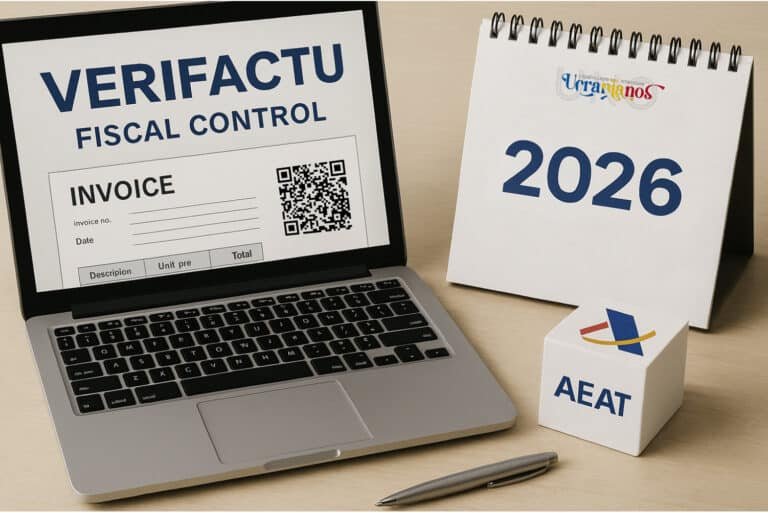UPD: postponed to 2027
All invoices in Spain are gradually going digital. The new VERI*FACTU standard will become mandatory for autonomous and companies, and the tax authority has already launched its own free invoicing system.
Subscribe to our Telegram channel https://t.me/ucranianos_uno — we regularly publish useful tips, news, and instructions for Ukrainians in Spain there.
I also invite you to our chat https://t.me/ucranianos_uno_chat, where we discuss topics from articles, share experiences, and help each other understand different situations.
Great article about Autonomo in Spain here.
What is Verifactu and how does it work?
Verifact is an invoice verification system created to provide greater transparency, traceability and real-time control for the Tax Agency (AEAT). Its main objective is to digitize and control the invoicing process in real time, preventing the issuance of false or duplicate invoices, and thus reducing tax fraud.
Basic functional requirements for the system
According to this regulation, billing systems (SIF) are required to:
- Generate and save or send to the AEAT the account summary, which is called registration record (billing register), at the time of its issuance.
- This registration record should include a number security and control measures, such as a digital fingerprint (fingerprint).
- The record must also contain information about previously generated record, which allows you to check for any omissions or omissions.
- Comprise QR code on the issued invoice. Reading this code (for example, with a mobile phone camera) allows the person who received the invoice to easily send certain data to the AEAT for possible reconciliation.
- Programs should guarantee integrity, traceability, preservation and availability records.
In practice, this means that the billing program autonomous must be connected to the Verifactu platform and automatically send invoice data to AEAT at the time of issue. Each invoice will receive unique code, which guarantees its identification and control by the Tax Agency.
How does Verifactu affect Autonomous (Autónomos)?
Using the Verifactu system will be mandatory for all taxpayers who issue invoices, including autónomos (self-employed individuals), small (pymes) and large enterprises.
Implementation timeline
The system is being implemented gradually:
| Subject | Deadline (Key Date) | Notes |
|---|---|---|
| Software manufacturers and distributors | July 2025 (or nine months from the date of entry into force of the Order) | From this date, they can only sell homologated (approved) software. |
| Companies subject to corporate tax (Sociedades) | January 1, 2026 | The first direct mandatory date for taxpayers. |
| Autónomos and small businesses (Pymes) | July 1, 2026 | Deadline for acceptance of homologated software. |
Mandatory use of the system
Although there is a colloquial term Verifactu, the Regulation provides for two modalities for compliance:
- Verifactu system: Provides for the immediate automatic sending of generated records to the AEAT electronic headquarters.
- Record retention modality (No Verifact): Records are stored in the billing system, but the software must still meet all security requirements and be ready to transfer data upon request to Hacienda.
For autonomous The Verifactu system is optional in the sense that they can choose the “No Verifactu” modality. However, regardless of the modality chosen, the software used must be homologated (approved) and be able to generate and store records in accordance with the Regulations.
The exception is autonomous, which are already in special regimes, such as SII (Suministro Inmediato de Información) or module modes (modules) or equivalent accrual (equivalence surcharge), as they already transmit data to the AEAT in real time.
How does Autónomo implement Verifactu?
To implement the Verifactu system autonomous you need to perform the following steps:
- Purchase compatible software: An invoicing program that meets the requirements established by the AEAT is required. Many platforms are already adapting their systems.
- Training and internal adaptation: You need to learn how to use the new system correctly to ensure the correctness of all processes.
- Connection to AEAT: The software must be connected to the Verifactu platform for automatic and secure invoice sending.
For issuing verified invoices autonomous has two options: use the special application that the AEAT will provide to users, or use any commercial software that includes this capability.
Benefits and Consequences of Non-Compliance
Benefits of using Verifactu
Although adaptation may seem like an administrative burden, the system offers the following benefits:
- Fraud Reduction: Sending invoices in real time significantly reduces the possibility of fraud.
- More control: Companies and Hacienda gain more control over the billing process.
- Saving time and simplifying declarations: Since AEAT receives data automatically, this may lead to automatic pre-filling (pre-rellenados) tax returns and accounting books.
- Avoiding fines: Quickly identify and correct errors in invoices, preventing sanctions.
- Transparency: The presence of the "VERI*FACTU" mark (Factura verificada por la Agencia Tributaria) on the invoice improves the image of transparency and trust in front of customers and the administration.
- Reducing inspections: Automatic data submission increases Hacienda's credibility and can reduce the likelihood of tax inspections.
- Reducing requirements: The AEAT may require less additional data as it has full access to all accounts.
Sanctions for non-compliance
If autonomous or the company does not comply with Verifactu requirements (for example, uses software that does not comply with the law), significant fines may be applied:
- Penalties for using inappropriate software: To 50,000 euros for each fiscal year (for each year during which software was used that does not guarantee the integrity and traceability of records).
- Sanctions for software developers: Developers who create or distribute programs that allow for falsification of records may be fined up to up to 150,000 euros per type of software and per year.
- Penalties for incorrect billing: If the invoice does not contain all the required data, there may be additional sanctions, which in some cases reach 10,000 euros.
Failure to meet deadlines may also result in loss of tax deductions and administrative blocking.
Free program for VERI*FACTU from the Spanish Tax Authority
The Spanish Tax Agency (Agencia Tributaria) has already introduced its own free invoicing software, compatible with the new VERI*FACTU system. This official solution allows autonomous and small companies to create electronic invoices and send them directly to the Agencia Tributaria, complying with the requirements of Royal Decree 1007/2023 of December 5.
The tax program has a simple interface, does not require additional subscriptions or licenses, and fully complies with the standards of the future mandatory electronic accounting, which will come into effect in January 2025.
You can test the system now on the official website:


